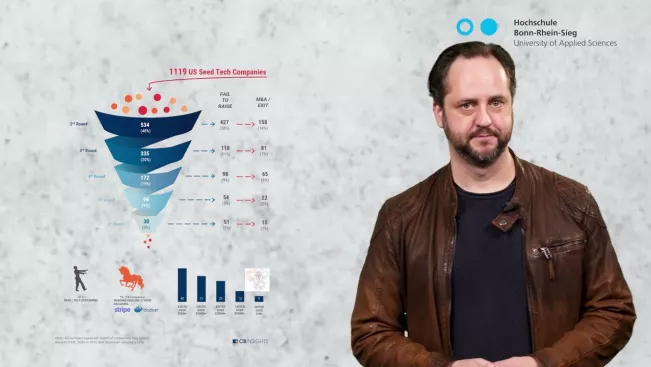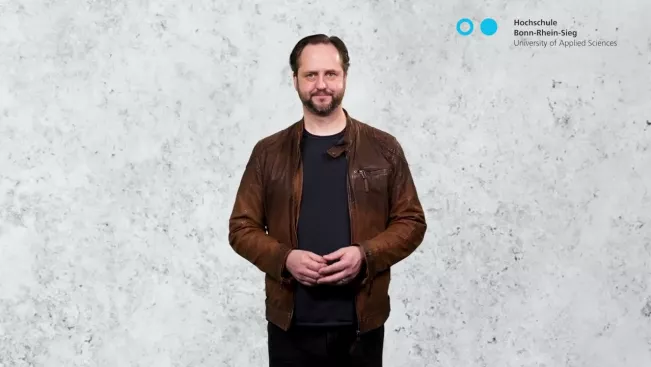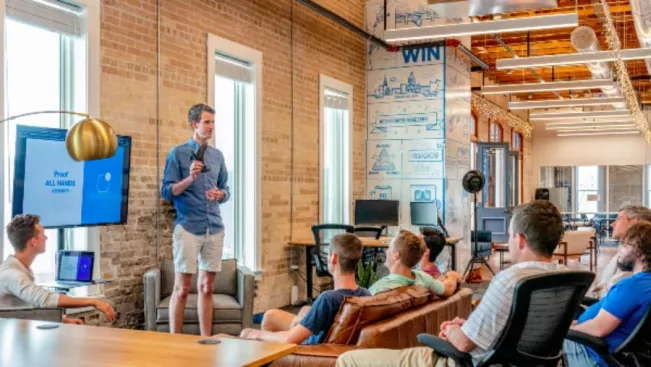Start-up Development and Impact Innovations (MBA) - discontinued
Study programme and module catalogue
Structured, flexible and customised
The features of the MBA curriculum at a glance

The seminars of the modular curriculum provide students with the entire start-up-relevant know-how as well as the tools and methods of business transformation in a practical way in order to drive forward the independent development of their own start-up or innovation projects in five semesters - in the fast track in four semesters. The special features of the MBA Start-up Development and Impact Innovations programme are specified and explained in more detail below:
Programme structure and teaching concept
The degree programme impresses with its special semi-virtual teaching concept, which guarantees maximum flexibility. The didactic design includes elements of blended learning as well as pure online and face-to-face teaching. With its high proportion of self-study and direct application focus, the Master's programme also promotes students' sense of responsibility for their own learning process and guarantees the necessary autonomy. It guarantees freedom for self-designed studies.
Reflection, consolidation and consolidation of the content of a module takes place in supplementary online formats MBA Connect. This mainly takes place outside normal working hours from Monday to Thursday from 5 p.m. on specific dates during the semester. Attendance dates are set before the start of the semester and are offered on Friday afternoons and Saturdays on selected weekends during the semester. As an important part of the programme, they are used in particular for personal development, direct application exercises and networking.
Modularised study schedule
The study programme has a modular structure. Modularisation means that study content and courses are combined into larger, self-contained and examinable content units. A module usually consists of several individual but thematically complementary courses. Students progress through the teaching programme module by module over the course of the semester; the modules resemble the chronological sequence of a start-up and are coordinated with one another in terms of focus. Each module concludes with a module examination at the end of the course. Participants earn internationally recognised and transferable credit points (ECTS) in each module.
The standard period of study is five semesters part-time or four semesters in the fast-track model. In the accelerated version, students have the opportunity to study the modules of the regular 4th semester on-demand and complete them in semesters 1 to 3. In addition, the programme can be flexibly extended as required. This means that the study period can be customised at any time, taking into account professional and family commitments.
Practice-focussed approach
The continuing education Master's programme "Start-up Development and Impact Innovations" combines in-depth academic knowledge with practice-oriented content and focuses on imparting knowledge and skills that are relevant for the conception and realisation of start-up and innovation projects as well as for corporate transformation. Special emphasis is placed on imparting the entire know-how relevant to start-ups as well as suitable instruments and methods for company transformation. This should enable participants to independently drive forward the conception, development and implementation of start-up and innovation projects and encourage them to develop a start-up idea or business innovation that combines economic, ecological and social aspects.
In order to ensure that teaching is up to date, at least 50 per cent of the lecturers are practitioners. Students are free to decide in each module in which context they would like to apply the content for themselves; either in the area of intrapreneurship to transfer the content to a company-internal innovation, or in the area of entrepreneurship and thus apply the module content to set up their own company and work on the assignment and examination result accordingly.
Cooperative learning process and interdisciplinary exchange
The MBA programme is geared towards the heterogeneous professional backgrounds of the participants and is characterised by its interdisciplinary orientation. It is aimed at both entrepreneurs and intrapreneurs. The cooperative learning process is based on a mutual exchange between the participants and with the teachers and coaches at eye level as well as on a variety of theoretical and practical approaches, which are supported by a diverse use of media. Didactically coordinated online and self-study phases are supplemented by face-to-face sessions for direct application and networking and enriched with knowledge from the start-up ecosystem.
Curricular alignment with the 2030 Agenda
The Start-up Development and Impact Innovations (MBA) degree programme is based on the 2030 Agenda for Sustainable Development and the 17 Sustainable Development Goals of the United Nations derived from it and thus reflects the defined core characteristics of holism, a comprehensive understanding of sustainability. Students are encouraged to develop a start-up idea or business innovation that harmonises economic, ecological and social aspects.
The study programme in detail

Our study programme is designed to provide you with the necessary skills and knowledge to succeed in the rapidly evolving world of sustainable business practices and innovation. The curriculum offers you a balanced mix of theoretical knowledge and practical skills to optimally prepare you for a career in sustainable and innovative business fields and supports you in setting up your own start-up or implementing innovation projects in your company.
Focus on your own start-up and innovation project
The following is a detailed overview of the study schedule, which gives you an insight into the structure and content of the programme. The detailed module descriptions can be found in the module catalogue (PDF) for download.
Pre-course Management Basics
The module Management Basics is offered as a semi-virtual preliminary course before the start of lectures in semester 1: This optional preliminary course is designed to make it easier for students, especially those without previous studies in Management Sciences, to get to grips with the subject matter; participation is recommended for all students (ungraded, without ECTS).
1. Semester
Ideation and Impact Innovation
In this module, you will learn how important innovation is for developing sustainable solutions and how you can use design thinking as an agile method for creating user-centred, innovative ideas - both for existing ideas and for developing new approaches. You will learn how to use design thinking from problem identification and idea generation to the realisation and testing of prototypes. You will further develop a central challenge and realise your start-up idea in an iterative process. This will enable you to recognise complex problems and develop effective, sustainable solutions that have a positive social and ecological impact.
Entrepreneurial Skills I - Purpose and Behaviour
In this module, you will develop a deep understanding of "purpose" - the meaning and purpose that is crucial for the functionality of companies and decision-making structures, as well as for your personal motivation. You will learn how to identify your own purpose and use it in a targeted way in your career and in organisations. You will also learn how to analyse organisational development from the perspective of purpose and how to communicate your findings clearly and convincingly. Team interactions and group dynamics are also a focus in order to strengthen your ability to work together effectively.
Sustainable Business Models and Business Plan
In the "Sustainable Business Models and Business Plan" module, you will learn how to develop and implement sustainable business models in order to combine ecological, social and economic goals. You will learn how to create a well-founded business plan that takes into account sustainability aspects as well as financial and strategic components. You will explore the challenges and opportunities of sustainable business strategies and develop practical solutions for environmentally friendly and ethical business management. The module provides you with the tools and knowledge to successfully plan and implement innovative and sustainable business models.
Impact Development I
This cross-semester module covers the basics of impact development. Within the interdisciplinary lecture series, researchers from different departments at H-BRS and other higher education institutions provide cross-topic insights into innovative research areas and thus provide impetus for your own start-up and innovation project. Founders of the green start-up economy provide insights into the real world and show how to plan and implement projects that have a measurable positive impact on society and the environment. These events take place in person or in the form of excursions and are supplemented by regular online keynote speeches.
2. Semester
Marketing
This module provides a comprehensive overview of modern marketing strategies and techniques. You will learn to position and market products and services effectively by applying marketing methods and tools to test product-market fit, e.g. hypothesis-based working, lean start-up, pretesting and prototyping experiments.
Transformation Management, AI and Next Generation Business
In this module, you will learn how to successfully transform companies using artificial intelligence and modern technologies. You will develop the skills to lead transformative processes and design innovative business strategies for the future. The module provides you with practical tools to effectively integrate AI and adapt business models, enabling you to achieve sustainable success and competitive advantage in a rapidly evolving business world.
Agile project management
Agile project management teaches you methods and techniques for managing projects flexibly and efficiently. You will receive an introduction to how to use agile project management methods such as Scrum, Kanban and Lean in various project scenarios and apply the Scrum framework to your real start-up or innovation project.
Impact Development II
Building on the knowledge gained in the first module, you will deepen your skills in the field of impact development and learn advanced techniques for implementing and measuring projects. Within the interdisciplinary lecture series, researchers from different departments at H-BRS and other higher education institutions provide cross-thematic insights into innovative research areas and thus provide impetus for your own start-up and innovation project. Founders of the green start-up economy provide insights into the real world and show how to plan and implement projects that have a measurable positive impact on society and the environment. These events take place in person or in the form of excursions and are supplemented by regular online keynote speeches.
3. Semester
Sales Management
This module focuses on the strategies and techniques of sales management. You will learn how to lead successful sales teams, how to develop sales strategies and how to conduct operational management in the field of "sales/sales", especially with regard to the many aspects of communication and their importance for successful performance.
Innovation communication and media design
Here you will learn the basics of communication strategies and media design and gain a basic understanding of the processes involved in the production of websites, print media and videos. You will learn about media-specific hardware and software required to produce media for use in pitches, image management and advertising. The focus is on the effective communication of innovations and the use of media to support business strategies with the aim of designing media products professionally and implementing them independently for your own start-up or innovation project using professional software and being able to work with service providers.
Fiance and Accounting
You will learn about fundamental areas of finance in start-ups and apply them to practical issues. This includes accounting, the preparation and interpretation of annual financial statements and the annual audit. This is supplemented by financial planning and knowledge of suitable financing instruments. Other focal points include interaction with investors, financing agreements, controlling and the role of the CFO in start-ups.
Impact Development III
In this advanced module, you will deepen your skills and learn how to manage complex impact projects and ensure their sustainable success. Within the interdisciplinary lecture series, researchers from different departments at H-BRS and other higher education institutions provide cross-thematic insights into innovative research areas and thus provide impetus for your own start-up and innovation project. Founders of the green start-up economy provide insights into the real world and show how to plan and implement projects that have a measurable positive impact on society and the environment. These events take place in person or in the form of excursions and are supplemented by regular online keynote speeches.
4. Semester
Law, Compliance, ESG
In this module, you will learn about the fundamental legal issues involved in setting up a company, understand them and apply them to practical issues. You will be trained in the principles of company law as well as in credit protection, labour, marketing, IP and tax law and will be able to understand and shape the legal framework and its consequences. In addition, we prepare you for ESG reporting, which is mandatory for large companies, and show you how compliance guidelines are implemented in the company to comply with laws and ethical standards.
Corporate Start-up Collaboration
You will learn to differentiate between various intrapreneurship structures such as incubators, accelerators and company builders and understand the differences between entrepreneurship and intrapreneurship. The module teaches you how organisations can be efficient and flexible at the same time and what role internal and external stakeholders play in innovation processes. You will gain in-depth knowledge of portfolio management and corporate venturing and analyse developments and trends in the field of innovation in order to derive well-founded recommendations for action. You will also reflect on your own skills, adapt flexibly to entrepreneurial challenges and develop strategies to increase entrepreneurial activity in existing organisations - and learn how successful cooperation between established companies and start-ups can work.
Leadership and New Work
In the Leadership and New Work module, you will explore modern leadership concepts and methods that are tailored to the needs and challenges of the new world of work. You will learn how to develop leadership skills to successfully lead teams in a dynamic working environment and promote innovation processes. The module also covers how you can effectively use agile working methods and new technologies to create a contemporary and motivating work culture.
Entrepreneurial Skills II - Digital Presentation and Communication
In this module, you will develop your rhetorical skills to give convincing speeches and digital presentations. You will learn how to structure your speech and digital presentation effectively, use body language in a targeted manner and give and receive feedback constructively in groups. The application-related content includes communication basics, structuring speeches, using media, memory techniques and the use of voice and body language. The Entrepreneurial Skills II module concludes with a pitch in front of an audience consisting of your fellow students, lecturers and potential investors.
5. Semester
Master's thesis
In the fifth semester, you will focus on your master's thesis and put your acquired knowledge and skills to the test. You will work independently and academically on a specific topic of your choice in the field of entrepreneurship or intrapreneurship, applying all the specialist and methodological skills you have learnt during your studies. You will use your research and information skills as well as your data analysis and evaluation skills to develop scientifically sound solutions in your thesis.
Fast Track

We offer a fast-track model for students who want to complete their degree programme more quickly. You can optionally complete the modules in semester 4 as on-demand modules in semesters 1 to 3 and write your master's thesis in semester 4. This reduces the total duration of your studies from 5 to 4 semesters. This model requires a high level of self-motivation and good time management, but gives you the opportunity to gain professional qualifications more quickly.
Gain insights into MBA teaching
Ideation and Impact Innovation
Ronnie Goertz, lecturer in the MBA Start-up Development (MBA) and Impact Innovations at Hochschule Bonn-Rhein-Sieg, outlines the content, structure, methodology and examination type of this module in the video. You can find out what it takes to achieve innovation success and how the design thinking method can help in the Ideation and Impact Innovation (formerly Innovation and Creativity) module.


Finance and Accounting

Insight into the module
Axel Nitsch, MBA lecturer and long-standing venture capitalist, gives an insight into the content that awaits you in the Finance and Accounting (formerly Entrepreneurial Finance) module in this video. About financing options, investor expectations and how to get rich - or what can go wrong - with start-ups.

Venture capital as a financing instrument for start-ups
In this video you will learn why a lot of money from investors does not always have to be the key to success.

Pitch deck: Your business card for investors
In this video, Axel Nitsch illustrates the importance of the pitch deck when talking to investors. In the Finance and Accounting module, you will learn what makes a good pitch deck and what investors expect.




